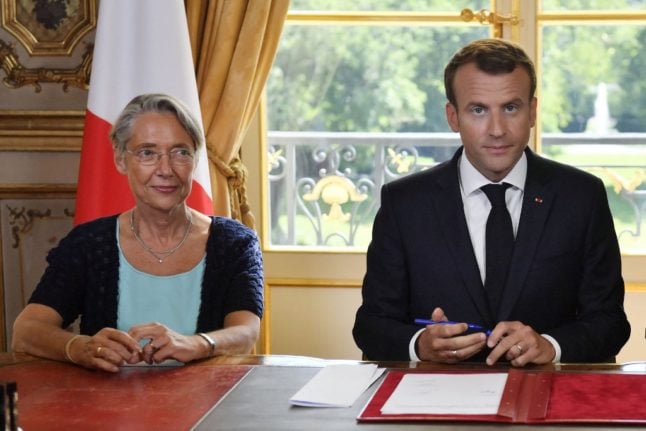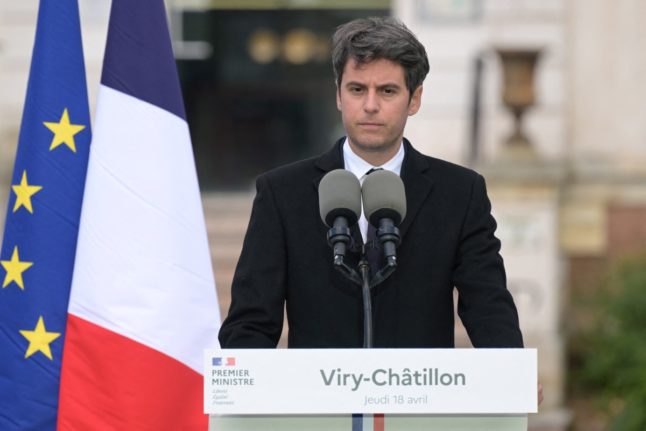The new French government has a Hollywood sound to it: “The Borne Experiment”.
President Emmanuel Macon will hope that it is not a thriller. Elisabeth Borne, a decent, highly competent woman has not been chosen for her charisma or her vaulting ambition.
She has been chosen because she has links to the Left, because she will be hard-working and self-effacing and because she is a woman. Macon thought, quite rightly, that it was time that France had another female prime minister.
The first, Edith Cresson, lasted only 10 months in 1991-2 – a victim of many things including the jealousy of her male Socialist colleagues.
Times have moved on since then. Gender is unlikely to be Elisabeth Borne’s biggest problem. Her first great challenge will be to run the campaign for Macron’s centrist alliance in the parliamentary election next month despite never having stood for public office of any kind.
READ ALSO: What does a French Prime Minister actually do?
As head of state, Macron is not supposed to lead the campaign in the parliamentary elections. He has already, in fact, been campaigning in semi-public, pushing the boundaries of convention.
Now that he has finally appointed a prime minister, Borne will be expected to be one of the principal voices and faces of the campaign. She will also be expected to weld, or at least sticky-plaster, together the seven different factions in Ensemble!, the federation of Macron-supporting parties.
Borne was one of Macron’s first choices for PM just after his presidential election victory three weeks ago. She was side-lined while Macron looked at other possibilities, precisely because she was considered to lack the experience, charisma and public-speaking skills to lead the parliamentary campaign.
At the end of last week, it was reliably reported, Macron had settled on another choice: Catherine Vautrin, a former centre-right minister and president of the greater Rheims conurbation in Lorraine. Several Macron barons objected.
They pointed out that Vautrin had been a vocal opponent of legalising gay marriage in 2012-4. Her appointment as PM, when Macron needed to attract the young and moderate left vote, would be unfortunate, they said.
Macron gave way. He returned to his original choice, the reliable Elisabeth Borne.
Although atypical (because she is a woman) Borne is in many ways a typical member of the French ruling class. She went to a Grande Ecole (elite seat of third level education). She worked in the private offices of senior Socialist politicians such as Lionel Jospin, François Hollande and Ségolène Royal.
She was the prefect (senior national government representative) of Poitou-Charente. She was the head of the Paris metro and bus service, the RATP.
Macron set out an impossible CV for his third prime minister. She must be a woman. She must have knowledge of environmental and social questions. She must have a strong regional base and political experience.
Elisabeth Borne fulfills the first three requirements perfectly. She comes nowhere near points four or five.
In some respects her choice for PM is proof of what many have pointed out to be the great weakness of the Macron years: his failure to build a grass-roots political movement and to encourage the emergence of sub-chieftains below the supreme leader.
It used to be that French prime ministers (not always but often) were the obvious lieutenants within the President’s political family. Now that the political families are dysfuntional and the parties scarcely exist, almost anyone it seems can have their Warhoilian moment in the Hôtel Matignon, France’s Number Ten Downing Street.
Jean Castex was plucked from near obscurity to be Macron’s second prime minister in July 2020 – and he made a pretty good fist of it. In choosing Elisabeth Borne, Macron has gone for a female Castex.
Her job is to be impressive but not so impressive that she overshadows Macron (as Edouard Philippe, Macron’s first PM had threatened to do).
She has to be ambitious to succeed but not ambitious for herself.
She has to learn how to be a politician while already holding the second most important job in French politics. She is running for parliament in “my” constituency, the 6th circonscription of Calvados in Normandy.
In purely electoral terms, Elisabeth Borne is a risky choice. Nonetheless, despite her inexperience and despite the fractious mood of the country, I expect her to “lead” the Macron parliamentary alliance to victory on 12 and 19 June.
For reasons I have explained here before, I believe that Jean-Luc Mélenchon’s Left alliance will do reasonably well but has no chance of winning a majority of the 577 seats in the national assembly.
A TV debate – if there is one – between the histrionic Mélenchon and the understated Borne will be a thing to behold.



 Please whitelist us to continue reading.
Please whitelist us to continue reading.
Member comments